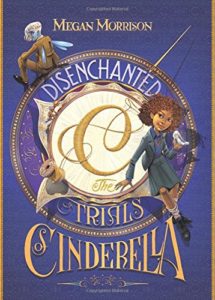Readers eager for more tales from Tyme will be disappointed by a story that is for more political than its precursor.
 Disenchanted: The Trials of Cinderella by Megan Morrison. Arthur A. Levine Books, 2016. 416 pages.
Disenchanted: The Trials of Cinderella by Megan Morrison. Arthur A. Levine Books, 2016. 416 pages.
Reading Level: teen, ages 10-12
While Grounded was a fairytale romp with thought-provoking themes and engaging characters, Disenchanted tackles weightier material.
Ella Coach has gone from rags to riches, and she hates it. The first chapter finds Ella running away from her fancy prep school, hoping to escape her arrogant, entitled classmates. Ella’s anger against the establishment is deeply personal since her mother died after years spent in a sweat shop.
Prickly and passionate, Ella makes an unusual friend —Prince Charming, who prefers to go by “Dash.” Meanwhile, superintending Ella’s fortune are Serge and Jasper —two fairy godfathers. (In addition to this role-reversal, the career has become politicized by the Glass Slipper godparent business.)
Morrison is a gifted author and the cleverness of her tale is undeniable. However her focus on Ella and Dash’s growing passion to reform sweat shops loses the charm of faerie. In addition, Ella’s obsession for reform and fair labor feels forced and almost preachy.
More troubling though are casual LGBTQ references throughout the story. (It was hard to miss the hints of a growing attraction between the two fairy godfathers, and other characters speak causally of being homosexual.) Though clean, this is not a story of redemption. Subplots include marital infidelity, abandonment, and willful independence.
All in all, a far cry from fairyland that will leave readers disenchanted.
Cautions: Worldview & Sexuality (See above)
Overall rating: 2.5 (out of 5)
- Worldview/moral value: 2
- Artistic value: 3
Support our writers and help keep Redeemed Reader ad-free by joining the Redeemed Reader Fellowship.
Stay Up to Date!
Get the information you need to make wise choices about books for your children and teens.
Our weekly newsletter includes our latest reviews, related links from around the web, a featured book list, book trivia, and more. We never sell your information. You may unsubscribe at any time.
We'd love to hear from you!
Our comments are now limited to our members (both Silver and Golden Key). Members, you just need to log in with your normal log-in credentials!
Not a member yet? You can join the Silver Key ($2.99/month) for a free 2-week trial. Cancel at any time. Find out more about membership here.
4 Comments
Leave a Comment
You must be logged in to post a comment.


How disappointing! Thanks for letting us know!
What’s wrong with LGBTQ representation? Gay people do exist and their appearances in books help people to understand that it is normal. Minority representation also helps kids develop empathy for different people. Many Christians support LGBTQ people. The fact that you found the appearance of gay people in a book troubling is utterly stupid and it is not an attitude that should be around kids. Telling kids someone is bad because of something like skin color or sexuality is dangerous. People like you, Christians like you had this kind of attitude to justify slavery and their children often grew up to become racists and KKK members. This attitude was not okay then and it is not okay now.
Also your review shows very little understanding of the subject of fairy tales and the themes of this book series. True this book wasn’t a light-hearted romp but neither was the first. Unless you think a child dealing with the realization of being a witch’s power source fun and happy. Or what about the witches who bargain for children so they can eat them? These books aren’t meant to be a copy of the source material especially when that source material is not as friendly and gentle as you think.
Anya,
As LGBTQ representation increases in children’s literature, Christians have to think long and hard about our response. We understand that gay people exist; they are our friends, neighbors, children, siblings. We get it. We love them. We also have pledged ourselves to Christ, to put him and his righteousness first in our hearts and minds. We understand from our reading of Scripture that LGBT behavior is a sin against God–not that gays, lesbians, bisexuals or transgenders are any worse by nature than any of us. “There is no distinction, for all have sinned and fallen short of God’s glory” (Rom. 3:23). We are not pointing fingers, but we are pointing to Christ who by his sacrifice for us has cleansed us from the guilt of sin. He has also made us willing to sacrifice our own sinful inclinations and live for him, however imperfectly and whatever the cost. LGBT behavior is not compatible with living for him (he says so, not us), and we’re not doing anyone a favor by covering up that fact.
When we encounter LGBT behavior in children’s literature presented as normal and beneficial, we will call attention to it and let parents make their own decisions. Sometimes a book has enough redeeming qualities to overlook an LGBT reference or character (and, as you say, we can’t pretend they don’t exist). But we are obligated to uphold God’s standards, in love, pleading with everyone to be reconciled to God in Christ. He is worth any cost.
(BTW, we don’t see skin color and sexual behavior as equivalent.)
As for fairy tales, I think we understand them. One reason they are so valuable is their universality and generality: when applied to a specific time period or political issue, their value is watered down. Authors are free to do that, of course, but at the expense of the story’s original power. I had some thoughts about that here: https://redeemedreader.com/2012/08/the-invasion-of-fairyland/
Thanks for your thoughts; sorry it took a week to respond.
Janie
Thank you for this review. I started reading this book with my daughter, but am going to stop. *Sigh*